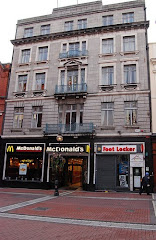This idea of a complex relationship with place definitely ties in with our discussion about "Araby"--about how you have to leave the familiar place to learn about yourself. I've found this to be very true in my life. I've gone on a few missions trips through my chuch youth group to West Virginia, and I definitely feel like my perspective on things changed a ton after I got back from the first trip--I started to care less about stupid things that used to cause my sister and I to fight a lot.
The comment that Miss Ivors makes to Gabriel along the lines of "what about learning more about your own people/country/culture?" has validity, yet at the same time is short-sided. The same question arises when considering going on a service-oriented trip: do you really have to go somewhere to serve people? The answer is no; however, the learning experience is so much greater when you see things in a way that you're not used to seeing them.
In a way, it's kind of humorous when you consider how often people appeal to the spirit of tradition to gain their audience's favor. When I was a junior in high school, I read a book called Moral Politics by cognitive psychologist George Lakoff in AP Government. It's about the various metaphors that liberals and conservatives use in shaping their worldviews. Essentially, the only metaphor that both sides share is the metaphor of Nation As Family. However, within this metaphor, conservatives are much more concerned with the Family being rooted in tradition. Liberals, meanwhile, might like the idea of tradition, but kind of wish the tradition was a little different. So both liberals and conservatives (because most worldviews kind of essentially boil down to this, though it shouldn't have to be this way) try to use tales of our "fathers" when trying to reach out to a broad audience (think of the titles of John McCain's and Barack Obama's respective books: Faith of My Fathers and Dreams From My Father). The slight humor in my eyes (some may not really find it humorous) is the obvious fact that everything about Barack Obama, his fame, and his vision, is oriented the future and not really the past. Everyone always try to connect everything to the past, which Gabriel does as well, and feebly so, in his speech. Why? Because it's easy. Because it's hard to face the complexity of one's relationship with place.

This is a really interesting post. I think Gabriel is a perfect example of someone who fits right in between both major themes of the class so far: holding on to the past but also wanting to escape and move on. I really enjoyed your insights about America's own connection to the past. It's interesting to look at how these characters in Irish literature think of America as a place aimed towards the future, while really, it suffers from many of the same setbacks: a stubborn refusal to let go of the past.
ReplyDeleteI really like this post. I feel like it captures the ambivalent feelings of Gabriel and Joyce perfectly. Joyce claimed that he hated Dublin and moved away at a young age, yet he spent the rest of his life writing about it. Clearly he had a greater connection with Dublin than he would like to admit.
ReplyDelete